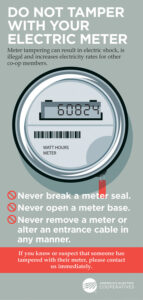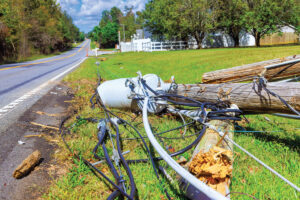 Every year, electric cooperatives across the country cope with thieves—folks who deliberately tamper with their electric meter to steal power. Not only is this practice extremely dangerous, it’s a serious crime that results in hefty fines and jail time.
Every year, electric cooperatives across the country cope with thieves—folks who deliberately tamper with their electric meter to steal power. Not only is this practice extremely dangerous, it’s a serious crime that results in hefty fines and jail time.
“We’ve seen people do some dangerous things—using knives, forks, magnets, jumper cables and any number of other objects to get around paying for the power they use,” explains Jim Miles, manager of safety and loss control for the Association of Illinois Electric Cooperatives. “However, not only are these persons stealing from their fellow co-op members, they’re also risking their lives and those of cooperative employees.”
According to the Cooperative Research Network, a division of the National Rural Electric Cooperative Association, power surging through a compromised meter can cause an electrical catastrophe. A short circuit could produce an arc flash bright enough to cause blindness and powerful enough to launch fragments of shrapnel-like, red-hot debris. Serious injury or death from electrocution, explosion or fire often results from meter tampering. Only trained electric cooperative personnel wearing protective clothing should work on meters.
“Anytime you get into a meter base, you run a risk,” comments Miles. “Tampering with your meter is illegal in Illinois, but more importantly, can result in injury and damage, even death. If you think there may be a problem with your meter, call your electric cooperative —don’t try to fix it yourself.”
Electricity theft is not a victimless crime. Thieves sometimes think it won’t hurt anybody. They illegally hook into a power supply, hook up a line that has been disconnected, or tamper with a meter to avoid recording electricity usage. The truth is that tampering with electrical equipment or attempting to steal electric power carries the potential to harm many people. The innocent consumers on the same line and utility personnel that work on those lines are all at risk when someone tampers with electricity or electrical equipment.
An overload of electricity could result in extremely high voltages that may damage the appliances of paying customers. Excessive current that is not safeguarded by a fuse is especially dangerous. In emergency situations such as fires, power has to be shut off to help firefighters and emergency medical personnel to enter a building safely. If lines have been interfered with illegally, the lines could remain energized, endangering the lives of the first responders.
Additionally, your not-for-profit cooperative loses revenue and expends resources to investigate tampering. These costs are then passed on to the entire membership. National estimates vary, but The Washington Post cited revenue protection officials who claim between $1 billion and $10 billion worth of electricity is stolen from utilities annually.
From a reliability standpoint, illegal connections to power sources and attempts to divert metering devices can overload the system, cause interruptions and compromise power quality.
Since everyone pays for lost power, please call your cooperative if you suspect meter tampering. All information can be given anonymously.
Sources: The Washington Post, Cooperative Research Network








